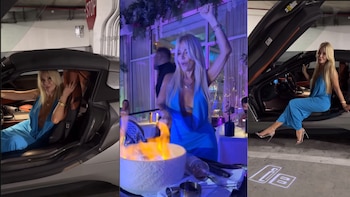“One day I asked Kissinger: 'Why did you disinterest in soccer? ' And he said, 'Because it was a very tough policy. '
With this anecdote from his time as the top leader of the Eastern Republic of Uruguay, Luis Lacalle Herrera tries to unravel the different types of “factual” powers that exist in society. It refers to sports, cultural - “all these shape the daily life we live”, he warns, and the most recent and most complicated, social networks: “In 140 characters there is no time for reflection”.
“It's action-reaction. Groups of those who think alike are created and the cowardice and violence with which they think is incredible. Trolls and influencers are the most dangerous novelty. It is a political and social phenomenon: the amuchamiento around binary concepts. It is a challenge that has no answer.”
These words were part of his dissertation Power and Democracy after being incorporated, through a Public Session, as a Corresponding Academician of the National Academy of Business Sciences (ANCEM).

It was the president of the Academy, Jorge Aufiero, who conferred that honor against other Senior Academics, such as businessmen Cristiano Rattazzi, Eduardo Eurnekian and Carlos Blaquier. “In addition to an extensive curriculum and various international and national distinctions, the Academy incorporates not only a great friend of a long time, but a great man who has maintained his ideas throughout his life, and enriched his heritage because he has been able to educate his son, the current Uruguayan president,” said Aufiero.
Politician, journalist and lawyer, Luis Lacalle de Herrera was the 36th president of Uruguay, between March 1, 1990 and March 1, 1995. Now the executive power in his country is in the hands of his son, Luis Lacalle Pou, who took office on March 1, 2020.
“I come from 62 years of experience in political life and the only thing I can do is reflect on what I have lived from within,” she confesses during her dissertation. “At 17 I dictated my first words in public and until today I haven't stopped. I am going to speak in the abstract,” he clarifies, “because I have to respect the political life of Argentina that I do not have to comment on. But there are cases that go beyond the limits, and that appeal to power and democracy; the networks of governments and their influences.”
“In our region we have gray areas,” he answers a question from Infobae about his vision of the state of democracy in Latin America. “I don't like to qualify but there's no doubt that from black to white we have all the shades. And that is why I always emphasize democracy of exercise, not only of origin, because they can vote for you and what good and the next day you do a scatter. It's a bit the story of some of the governments here... Chávez began like this, with governments of legitimacy of origin, and we all know how they are there.”

During his speech, he emphasized that the three powers in which a Republic is organized must be improved, not replaced. “In these powers, political parties have a different and separate role,” he says.
He doesn't like to add any adjectives to the word “democracy”: “The Soviets' 'popular democracy' was something very different from our democracy; 'participatory democracy' seems tautological because if something is participatory it is essentially democracy”.
“Any power scheme to be accepted must have clarity and well-established boundaries,” he says. “Democracy must be representative, there is no other way. It is republican because it is the structure in which it lives most comfortably.”
He also expressed the view that in today's democracies “the common good is rarely fulfilled when laws are passed, it is always for specific sectors. However, our system of powers, although heavily criticized, is still the best formula.”
He does not agree that it is the Executive, as in the United States, who appoints the judges. “In Uruguay they are appointed by Parliament. There should be a greater link between the Legislative and the Judicial and for the Executive to be alien.”

In addition, he highlighted the role of citizens as a subject of power: “Today the fact that the citizen is as much and as much as paying taxes is lost. The ruling classes disregarded themselves from public service. In Argentina and Uruguay we have to revalue and participate. This is one of the burdens of those who have a better time: taking charge and dedicating themselves to public service, because their circumstances are a responsibility; we remember rights but not duties.” And he warns: “Beware of leaving politicians alone with politics.”
Along these lines, he concludes: “Power is exercised alone, not in isolation, but sometimes they have been isolated in a bubble. This is one of the great dangers facing democracy.”
Gustavo Gavotti: Photos
Keep reading:
Últimas Noticias
Debanhi Escobar: they secured the motel where she was found lifeless in a cistern
Members of the Specialized Prosecutor's Office in Nuevo León secured the Nueva Castilla Motel as part of the investigations into the case

The oldest person in the world died at the age of 119
Kane Tanaka lived in Japan. She was born six months earlier than George Orwell, the same year that the Wright brothers first flew, and Marie Curie became the first woman to win a Nobel Prize

Macabre find in CDMX: they left a body bagged and tied in a taxi
The body was left in the back seats of the car. It was covered with black bags and tied with industrial tape
The eagles of America will face Manchester City in a duel of legends. Here are the details
The top Mexican football champion will play a match with Pep Guardiola's squad in the Lone Star Cup

Why is it good to bring dogs out to know the world when they are puppies
A so-called protection against the spread of diseases threatens the integral development of dogs




